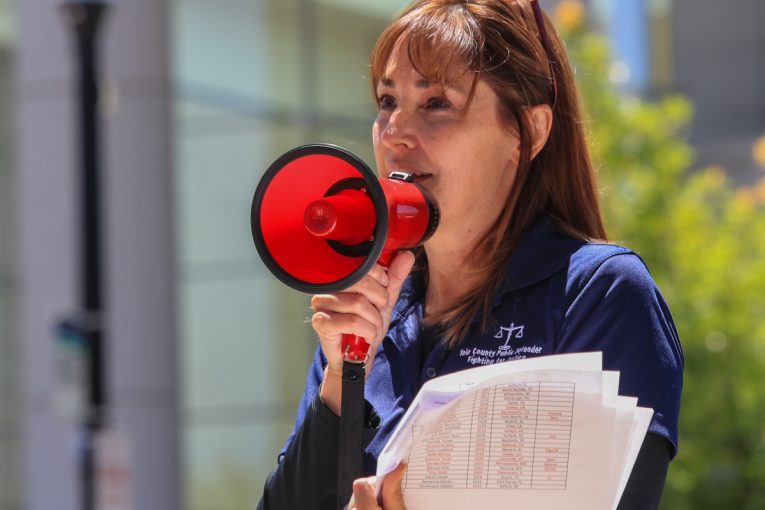

By Tracie Olson, Emily Kochly, and Sara Johnson
If it is true that the character of a society is measured by how it treats its most unfortunate, downtrodden, and vulnerable, then much reform is necessary to make America the fair, just, and equal society that we often boast it to be. We live in one of the richest countries in the world, yet millions of Americans live in poverty, struggle with homelessness, and have insufficient access to basic health care. As public defenders, we see every day how these underlying and unaddressed issues bring our clients into contact with law enforcement. And every day we stand by our clients as the criminal justice system, acting as an agent of our greater society, imparts punishment over compassion.
In our current system, the processes and players that are supposed to provide justice give clue to our society’s real opinions: that we prefer to minimize the problems and pitfalls of the less  fortunate and penalize them. Imprisonment is the favorite remedy to complex underlying issues, and the public has willingly become indoctrinated in the notion that retribution is the only thing that can make victims whole. We pay a steep price for these ideas: in a massive budget and in the consequence of devaluing human lives.
fortunate and penalize them. Imprisonment is the favorite remedy to complex underlying issues, and the public has willingly become indoctrinated in the notion that retribution is the only thing that can make victims whole. We pay a steep price for these ideas: in a massive budget and in the consequence of devaluing human lives.
While society has agreed to reduce punishments for property and drug crimes, there is a category of crime that makes people unwilling to look for redemption – violent crime. Through assignment of this “violent” label, people can become virtually invisible, where the crime is now their identity. This refusal to see people in their entirety, to understand their personal histories and to acknowledge their subsequent rehabilitation, makes it easy to cast them off as unworthy, irredeemable, and bad. It takes courage to move beyond labels and make room for compassion in criminal justice.
Persons being considered for early release by the State are considered low-risk to reoffend. Through years of hard work, many incarcerated persons have prioritized self-improvement and rehabilitation. These individuals have earned college degrees, learned vocations and trades, volunteered time and energy to mentor others, and demonstrated personal accountability and remorse. Often, it is those serving the longest sentences that have demonstrated the clearest transformation and pose the lowest risk to others.
As public defenders, we are privileged to bear witness to the difficult experiences and redemptive journeys that many of our clients live. Their journeys of rehabilitation are private and painful, which means they rarely make the news, but that doesn’t mean rehabilitation doesn’t happen. We see our clients; not as others, but as us. We wish you would, too.
Tracie Olson is the Chief Public Defender of Yolo County. Emily Kochly is a Licensed Mental Health Professional in the Yolo County Public Defender’s Office. Sara Johnson is an attorney in the Post-Conviction Unit of the Yolo County Public Defender’s Office.
To sign up for our new newsletter – Everyday Injustice – https://tinyurl.com/yyultcf9

When we were experiencing “Little Lebanon” in the rail triangle during April and May, we could not get specific information about the meth heads, dealers, hoarders, bike thieves and mentally-ill who inhabited the encampments, but were minimally informed that most had records of arrest for violent crimes. Considering from their behavior they gave not a sh*t about their neighbors who had worked within the system to get a roof — whatever you may think of that system — knowing that “label” was helpful in being extremely cautious during that time of total insanity. Since they never slept, those of us nearest the encampments lost a lot of sleep during that period.
My sympathy does not go first to those who choose to operate outside the law, and I despise beyond nearly all those reformer and progressive-lawyer types that attempt to legitimize and validate those behaviors as acceptable.
OK. How good is the record of those in charge of judging for release? How well have ‘rehabilitated’ individuals, while within incarceration, done when released back into the world, face again with temptation and making their own way in the world?
Also, is there any acknowledgment of individuals who remain a danger to society? Were this article not so one-sided, I may have more of a tendency toward believing the concept. The way this article arc is going, I half expect an article in the DV in a few days that simply calls for all jails and prisons to be torn down and everyone released, because it’s the fault of society that they are in there in the first place.
I believe the above sentence is an argument for long sentences.